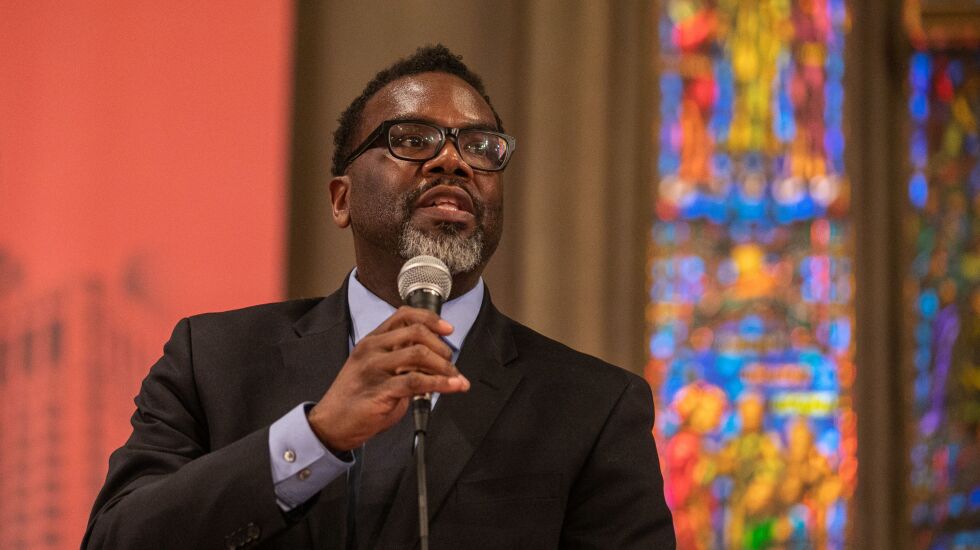
U.S. Rep. Jesus “Chuy” Garcia was accused Thursday of “abandoning the progressive movement” by “copying and pasting” Mayor Lori Lightfoot’s failed plan to deliver Chicago from violent crime.
Mayoral challenger Brandon Johnson, the Cook County commissioner and Chicago Teachers Union organizer, came out swinging against Garcia and would not commit to supporting Garcia — and reuniting the fractured family of progressives — if Garcia makes it to a mayoral runoff and Johnson doesn’t.
In 2015, Garcia forced then-Mayor Rahm Emanuel into Chicago’s first mayoral runoff on the strength of foot soldiers and campaign cash provided by the Chicago Teachers Union. Garcia stepped in when then-CTU President Karen Lewis was forced to drop out of the race after being diagnosed with a brain tumor.
But you’d never know it from Johnson’s description of Garcia, who gave Lightfoot a pivotal runoff endorsement in 2019.
“Congressman Garcia ... has been a staunch ally of Lori Lightfoot. He was a part of her infrastructure and her administration. He literally copied her entire so-called ‘public safety plan.’ As a teacher, I would call that plagiarism. ... Those are not progressive values,” Johnson said.
“It’s unfortunate that Congressman Garcia has abandoned the progressive movement. … He is proposing an agenda that is being moved by the Fraternal Order of Police. Progressives understand … that safe communities require investments.”
The Garcia campaign had no immediate comment.
With police officers retiring faster than the city can hire replacements, Garcia is vowing to fill all 1,600 police vacancies and maintain the Chicago Police Department’s $1.94 billion 2023 budget.
Johnson said anyone who claims they can easily fill the 1,600 police vacancies — or that it is the right move to do so — is “lying” to crime-weary Chicago voters and ignoring the economic insecurity that is driving violent crime.
“We are experiencing an explosion of violent crimes because you have politicians like Lori Lightfoot and Paul Vallas and Congressman Garcia [who] continue to propose the same old, same old that leaves us less safe with unrealistic goals that have not delivered results. ... Where are they gonna get 1,600 police officers from?” Johnson said.
“The police budget is bigger than it’s ever been, and we’re still not safe. … The safest cities in America all have something in common: They invest in parks. They invest in schools. They invest in transportation. They invest in public health. They invest in affordable housing. … There is a direct correlation between youth employment and jobs and violence reduction. We have to invest in people.”
Johnson said he will unveil his public safety plan only after figuring out a way to pay for it. And that will happen after he takes the wraps off his financial plan next week.
He offered a sneak preview that includes reopening Chicago’s shuttered mental health clinics and creating a 24-hour hotline with “mental health responders” taking the pressure off police officers, whom, he claims, are “ill-equipped” to respond to “40% of the calls that come through 911.”
United Working Families, a progressive group affiliated with the CTU that has endorsed Johnson’s candidacy, has long championed a $4.5 billion wish list of revenue-generating ideas it says would level the playing field between Chicago’s haves and have-nots.
It includes a 3.5% city income tax on Chicagoans and suburbanites earning more than $100,000 a year; a financial transaction tax; a 66% increase in the city’s hotel tax, which is already the highest in the country; a revived employee head tax; and raising the real estate transfer tax on high-end home sales.
Johnson said Thursday those are all “strong ideas we must consider” to make Chicago a place where working families can “afford to live.”
Asked specifically about a city income tax, Johnson noted Chicago voters “overwhelmingly supported” the failed constitutional amendment for a graduated income tax championed by Gov. J.B. Pritzker.
“The flat structure that we have right now continues to cause havoc. Schools are being closed. Mental health care facilities have been permanently closed. Our public transportation system is unreliable and unsafe. We don’t have a real robust public housing, affordable housing plan. We don’t have a safety plan in Chicago that speaks to investments like other safe American cities do,” he said.







